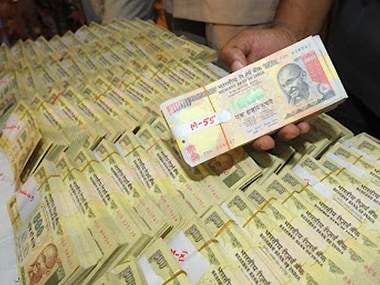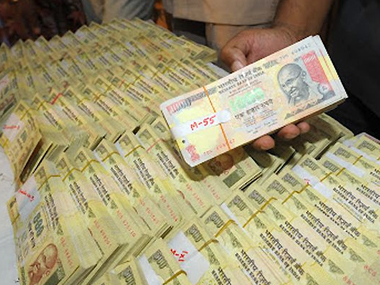The central government on Thursday said over the counter exchange of old Rs 500, Rs 1,000 currency notes will be stopped with effect from midnight. Also, the Rs 1,000 notes has been banned from public use from now on including for essential activities listed under the exemptions. The government has also extended the deadline for exemptions, where old Rs 500 notes can be used till 15 December. [caption id=“attachment_3121940” align=“alignleft” width=“380”]  Representational image. PTI[/caption] "It has been observed that over the counter exchange of the old currency notes of Rs 500 and Rs 1,000 denomination has shown a declining trend. It has further been felt that people may be encouraged and facilitated to deposit their old Rs 500 and Rs 1,000 notes in their bank accounts," the Finance Ministry said in a release on Thursday evening. “This will encourage people who are still unbanked, to open new bank accounts. Consequently, there will be no over the counter exchange of old Rs, 500 and Rs 1,000 notes after midnight of 24 November,” the release said. Banks will, however, continue to accept old Rs 1,000 notes as deposits, the release said. On 8 November, Prime Minister Narendra Modi announced one of the biggest demonetisation exercises India has seen in several decades by banning the Rs 500, Rs 1,000 notes stepping up the government’s attack on black money, counterfeit notes and terror finance. The move resulted in massive disruptions in public life with bank branches and ATMs running out of cash in the subsequent days. The move impacted small traders, vendors and thousands in the informal economy, triggering political protests. The Government has also been receiving various suggestions in this regard. Subsequently there have been modifications in these measures. The release said the government has been reviewing the issues arising out of the cancellation of the legal tender character of the high denomination notes. The government further clarified that foriegn tourists will be allowed to exchange foreign currency up to Rs 5,000 per week Following are the list of places where the old Rs 500 notes will continue to be accepted till 15 December: - All government Schools will accept old Rs 500 notes as academic fees up to a limit of Rs 2,000 per student. - Central or state government colleges will also accept fees in cash in old currency notes. - Citizens can now recharge their pre-paid mobile phones in old currency up to a limit of Rs 500 per top-up. - Consumer cooperative stores will also accept old Rs 500 notes, however, there will be a limit of Rs 5,000 at a time. - Individuals and households can pay current bills and arrear dues in old currency for water and electricity only. - The toll charges remain suspended till the 2 December and thereafter payment can be made in old Rs 500 notes. This facility will be available only till 15 December.
Rs 1000 notes has been banned from public use from now on including for essential activities listed under the exemptions.
Advertisement
End of Article


)

)
)
)
)
)
)
)
)



